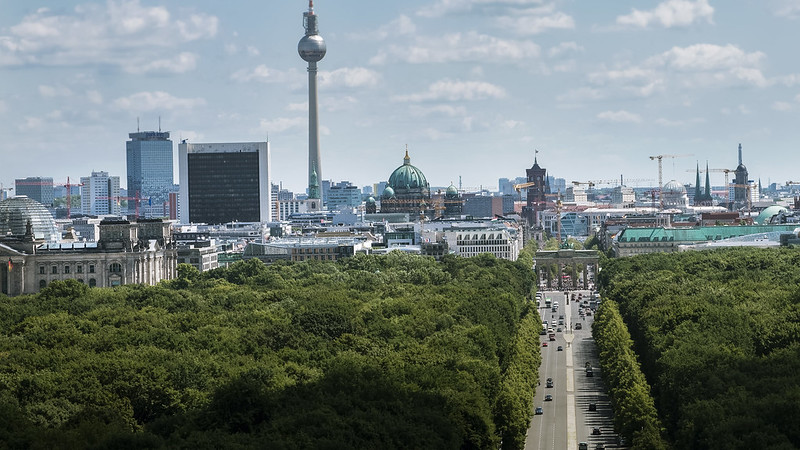Germany must become carbon neutral by 2038 to avoid overshooting its carbon budget to limit global temperature rise below 2C, researchers at the independent Advisory Council on the Environment (SRU) have said.
Every four years, the SRU presents a comprehensive report on the state of the country’s environment and has been doing so for almost 50 years.
On Thursday, it did it again: on almost 560 pages, the seven climate researchers of the SRU have done an all-round job which doesn’t paint a particularly good picture for Germany.
Germany is not on track with 20 of the 25 environmental goals of its own sustainability strategy, according to the report. And binding targets on water protection, air quality and climate protection are regularly missed.
“So far, the failures are too often simply accepted and targets are postponed into the future,” the researchers noted.
Germany’s environment minister Svenja Schulze (SPD) seemed open to criticism. In a video message, she said the growing warnings by environmental researchers for the past 30 years risked becoming an “oppressive ritual”.
Climate news in your inbox? Sign up here
SRU researchers have sounded the alarm with very concrete figures.
Germany is allowed to emit 6.7 billion tonnes of CO2 from 2020 if global warming of 1.75C is taken as the target, which researchers consider to be the highest possible target to stay below 2C.
But if business as usual continues, this limit would already be reached in 2029. Consequently, if emissions were to be reduced linearly, Germany would have to be climate-neutral by 2038 at the latest, they argue.
“We will only achieve this if very, very strong reductions take place from 2030 at the latest,” said climate researcher Wolfgang Lucht.
The warnings of the Advisory Council echo similar messages by climate activist Greta Thunberg. Speaking to EU environment ministers in March, the teen activist warned about the rapidly declining amount of carbon dioxide that world nations are still allowed to emit before the rise in global temperatures risks hitting dangerous levels.
However, not all politicians are ready to consider carbon budget calculations.
In a statement yesterday, the head of the conservative alliance CDU/CSU parliamentary group, Georg Nüßlein, said that “the path to greenhouse gas neutrality must not, however, be lost in the small-scale climate budget”.
Instead, he called for more market-based tools and competition, including an expanded European emissions trading system, to achieve climate goals.
Shorter supply chains needed to end hunger after pandemic: UN envoy
Nüßlein also denounced the connections environmentalists have made between the climate crisis and the coronavirus pandemic, saying it testified of a “fear among some climate experts that [the climate debate] would no longer be featured in the media”.
The CDU/CSU faction led by Nüßlein has recently published a controversial position paper in which he supports the European Commission’s Green Deal, but clearly rejects increasing the 2030 climate targets to 55% of emission reduction by 2030, up from 40% now.
In the report by independent advisors, criticism has also been levelled against the Germans’ favourite means of transport, the car.
“After the corona crisis, we must think carefully about what we promote. Every car with an internal combustion engine will continue to drive around and emit pollutants for at least another ten years,” said the advisory council’s chairwoman Claudia Hornberg.
In order to make driving in cities less attractive, expensive parking fees and a nationwide uniform road toll should be introduced, while environmentally friendly transport modes should be promoted, the researchers argued.
But not all advisors agreed. Building physicist Lamia Messari-Becker said there were need for a blanket demand for less car traffic but supported the introduction of CO2 emissions trading in the transport sector, as the German climate protection law already provides for from 2021.
The German climate experts also looked to Brussels to drive further climate action.
The European Green Deal is a “very good initiative”, but big promises are not enough, warned Christian Calliess, a professor of environmental law and a member of the advisory council.
“Ambitious programmes are adopted, but when it comes to concrete implementation, they are often missed,” he added.
Calliess called for the consistent integration of climate targets into all areas of EU policy, especially in the critical sectors of agriculture, transport and fisheries. Otherwise, he warned, biodiversity could reach an irreversible tipping point.
He suggested that all EU initiatives should be subjected to a sustainability check, adding European economic policy coordination could also help in this respect. The European Economic and Social Committee (EESC), for example, could carry out this screening, he suggested.
According to Calliess, however, some leeway must be offered to EU member states. “The EU must not always lose itself in the minutiae,” he said.
Above all, the EU should formulate minimum standards, because one cannot “put a European corset on everything,” Calliess said. EU member states must find their own regional solutions to the climate crisis, he added.
This story is an extract of a piece originally published by our media partner Euractiv.
